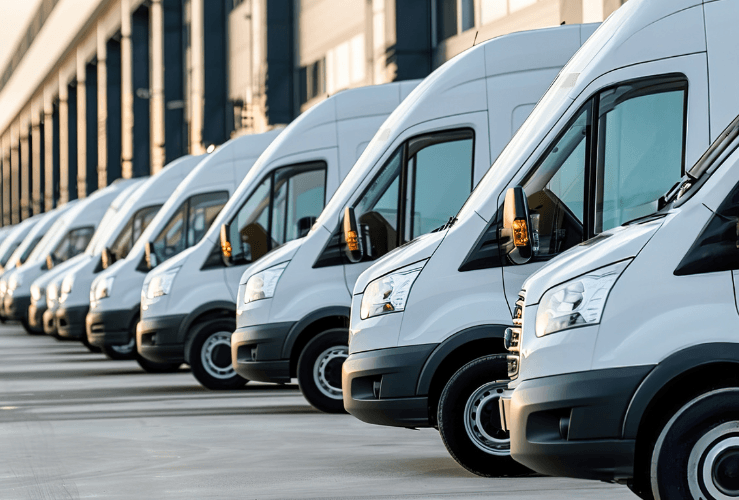To find a great fit for your fleet, you need to ask the right questions.
If you work in corporate fleet management, you’ll know that nothing dents a company’s cash flow harder than buying a new vehicle - or indeed, replacing an entire fleet.
This most sizable of investments, then, demands a good deal of consideration.
Choosing the right vehicles will make a direct contribution to operational efficiency, cost control, and sustainable growth.
The assets you select must align with your firm’s commercial goals, logistical needs, and of course, financial constraints. It’s quite simply an investment that has to pay off.
In truth, however, it's unlikely you will find the perfect vehicle or set of vehicles: your final choice will probably involve some trade-offs: for example, you may spend more than you initially wanted to in order to acquire vehicles with certain features or advantages; or choose cheaper models in order to have enough capacity in your fleet.
But whatever allowances you have to make, you can still get very close to an optimal vehicle.
If your fleet is in the market for a new vehicle or set of vehicles, this article will help focus the mind on making decisions that will give you the best chances of success, while controlling costs in the short, medium and long term.

Corporate fleet vehicles: What are your business needs?
The specific needs of your business must remain front and centre when choosing a new vehicle. What is the primary purpose of the fleet? For a delivery firm, vehicles that balance cargo capacity with fuel efficiency are probably going to be a key consideration. On the other hand, a construction company may need to prioritise durability, load-bearing capabilities, and off-road performance - all of which may mean spending more.
Here are some factors for your corporate fleet management team to think about:
Nature of goods/services
It goes without saying that different types of cargo require different types of vehicles. Temperature-sensitive products - such as dairy, meat, fruit and vegetables, not to mention some medicines - will need refrigerated vans/lorries, while construction materials would need vehicles with high levels of durability.
Distance and route requirements
Understanding typical travel distances and terrain helps determine vehicle range and fuel type. If your fleet operates smoothly on urban routes with frequent stops, you might focus on fuel-efficient vehicles that are also compact - so they can negotiate often-narrow UK roads and backstreets. Electric or hybrid models could be cost-effective in such scenarios.
Conversely, long-haul logistics firms will need fuel-efficient models suitable for highways, and that are large enough to carry large or heavy loads. Here, diesel models offer better fuel efficiency, although in the future electric lorries may have the edge.
Frequency and volume of trips
High-frequency trips with substantial cargo loads may necessitate vehicles with excellent durability and higher load capacity, while less frequent journeys might benefit from a more varied fleet.
Budgetary constraints
Those given the task of procuring new corporate fleet vehicles rarely have a blank cheque: you’ll need to carefully consider how to get the most value for your budget. Think about both initial acquisition costs and long-term operating expenses (i.e. repair costs, likelihood of breakdown, availability of spare parts).

Fleet vehicle selection: Your checklist
Several factors come into play when choosing fleet vehicles, and they should all - as far as possible - align with your fleet’s specific needs and financial goals. Here are some of the most important factors to add to your checklist.
Fuel efficiency
Fuel consumption is a major operating cost for fleets, and may well only come second in scale to vehicle acquisitions. Oil - and therefore fuel - costs have risen steadily over the last 10 years and there’s no reason to think this won’t continue.
Fuel efficiency is also directly linked to environmental concerns - because the more we use, the more the environment is harmed. Indeed, 27% of the UK’s emissions are from transport, which is why fuel efficiency has become a top priority.
Fleets that run smaller vans (i.e. non-HGVs) might opt for hybrid or electric vehicles for urban fleets, which offer excellent fuel savings and are more environmentally friendly. Additionally, fleets who run diesel vans should bear in mind that sales of all new diesel vehicles (and liquid petroleum gas, petrol and hybrid vehicles) will be banned in the UK from 2035.
That said, given we have a decade before the ban, diesel engine-vehicles are worth a thought: though more costly upfront, often offer better fuel efficiency for long-distance haulage. This though needs to be balanced with their environmental impact.
Total cost of ownership (TCO)
The total cost of ownership goes beyond just the initial purchase price, encompassing factors such as fuel, maintenance, depreciation, insurance, and resale value. A higher initial investment in a more durable, reliable model might yield your fleet long-term savings, while a cheaper model might prove to be a ‘false economy’.
Calculating the TCO for each vehicle helps avoid unexpected costs and enables better budget planning. That said, hitting on an accurate TCO is almost impossible - but you can get a reasonable idea of it by adding purchase price, maintenance costs and repair costs.
Vehicle durability and reliability
In an ideal world, fleet vehicles would require zero repairs and downtime - but this isn’t an ideal world. With this in mind, vehicles from manufacturers with solid reputations for durability and reliability are often worth the investment, since they will pay dividends in reduced repair and maintenance costs - as well as downtime.
You should also think about how easy it will be to get a particular model serviced: Purchasing vehicles with a strong support network and good availability of spare parts helps reduce repair times and costs - vital for businesses who can’t afford to have too much downtime.
Load capacity and payload
Understanding a vehicle's load capacity and payload limitations is crucial, especially in industries like logistics, where maximising cargo-per-trip is important. However, overloading vehicles on a regular basis can lead to excessive wear and tear, compromising both vehicle lifespan and safety.
Selecting a vehicle with the appropriate/required capacity and avoiding overloading - can prevent such issues and maximise the fleet's overall efficiency and lifespan.
Safety features
Data shows that investing in vehicles with advanced safety features like collision avoidance systems, lane departure warnings and adaptive cruise control can help reduce accident rates, and is essential for maintaining fleet efficiency, keeping employees safe and protecting the brand’s reputation.
Additionally, safety features may also lead to lower insurance costs, further reducing overall expenses and protecting that all-important bottom line.
Resale value
While it may not be a primary consideration during purchase, a vehicle’s resale value can impact long-term fleet costs. Some brands and models tend to retain their value better due to factors like reliability and popularity in the used market.
By analysing market trends and historical resale values you’ll be able to select models that will offer a better return on investment at the end of their lifecycle.
In some cases, vehicles may be sold in advance of the end of their lifespans, in order to get a higher sale price.
Environmental impact
Many companies now factor environmental concerns into their vehicle selection. As well as being ‘the right thing to do’, government legislation is another factor - with sales of all new diesels and petrol vehicles set to end in 2035. Moreover, hybrid and electric vehicles (EVs) have lower emissions and some models may qualify for a plug-in grant (£2,500 off small vans, and £5,000 off large vans).
In addition to being environmentally responsible, these options help fleets build a more positive public image.

Harnessing technology for optimised selection
Fleet management software and data analytics have come on leaps and bounds in recent years. They can now provide critical insights for optimising vehicle selection and are invaluable to business vehicle management teams.
Telematics systems, for instance, offer data on vehicle performance, fuel consumption, driver behaviour and route efficiency. Companies can use this data, combined with repair/downtime records, to evaluate the suitability of different models based on real-world performance - and decide whether to buy more, or to invest in subsequent incarnations of a particular model.
Based on past trends, data analysis tools can also help predict future fleet needs, such as seasonal surges in demand or peak times for maintenance and repairs.
By leveraging historical and real-time data, fleets can make better-informed decisions about the types and quantities of vehicles they need.
Flexible fleet management models: What are your options?
Cash flow is king for fleets, since without enough funds to cover expenses, things can ‘go south’ rather quickly.
Flexible corporate fleet management options such as leasing, renting, or vehicle subscriptions can give businesses with more control over their cash flow - as well as their fleet composition. These options are especially useful for companies with fluctuating demands (or which may be impacted by economic downturns or upturns), since they allow for easy scaling of fleets - without long-term commitments.
Leasing
Leasing is popular for businesses looking to avoid shelling out large sums for new vehicles. It allows companies to rotate vehicles more frequently, ensuring access to the latest technology and minimising the risk of outdated, inefficient vehicles. It also helps bolster the fleet’s brand image - since newer vehicles tend to be more impressive than older ones, and give the impression of success.
Vehicle subscriptions and rentals:
These short-term options offer the ultimate flexibility, making it easy to adjust fleet size as needed.
While often more expensive per vehicle, they’re ideal for handling seasonal demand, when the increased revenue justifies the higher subscription/rental costs, and ensures the fleet does not have to turn away business.
Subscriptions and rentals can also be used for testing different vehicle types.
Sustainability considerations: Going - and staying - green
In 2023, a UK survey by Ipsos Mori found that 77% of respondents were concerned about climate change. As environmental awareness in the general public continues to increase, many businesses are prioritising sustainable fleet choices.
In addition to opting for fuel-efficient or electric vehicles, companies can implement various policies and processes to reduce fuel consumption and emissions. For instance, optimising routes through GPS and telematics systems can reduce unnecessary mileage - alongside wear and tear. Additionally, training drivers on fuel-efficient driving techniques can lead to significant improvements in overall fleet fuel economy. Telematics, meanwhile, can help pinpoint driving behaviour that is less than efficient, so that appropriate action can be taken (extra training; reprimanding etc.).
Government policies and incentives increasingly support sustainable fleet options, with grants (mentioned above) and the Workplace Charging Scheme, although this ends on March 31, 2025. Tax rebates and grants for electric vehicles or hybrids, therefore, make environmentally friendly fleets more financially viable.

Balancing cost and performance with future needs
With rapid advancements in vehicle technology, it is essential to plan for future fleet upgrades.
Autonomous vehicles, for instance, are expected to revolutionise the logistics industry within the next decade. By investing in versatile vehicles and scalable fleet management systems (such as subscriptions and leasing), businesses can, to a large degree, future-proof their fleets.
Selecting modular or upgradable vehicles, meanwhile, can provide that all-important flexibility as technologies evolve - and new business needs emerge.
Business vehicle management: Making the best choices
No fleet acquisition is perfect, but there are steps you can take to get pretty close.
Optimising your fleet’s vehicle selection demands a strategic approach that balances immediate business needs with long-term goals. You must understand your fleet’s operational needs, evaluate its costs holistically and stay informed about technological advancements, as well as sustainability trends.
While an ideal fleet does not exist, if it did, it would deliver high performance, low costs and environmental benefits, ultimately supporting its commercial objectives. But by prioritising efficiency, adaptability and future readiness, companies can create a fleet that enhances operational effectiveness and supports sustainable growth.
Careful planning, in-depth market analysis and the adoption of flexible fleet management options are crucial for building a cost-effective and performance-driven fleet. Through thoughtful selections, while keeping an eye on emerging trends, businesses can build fleets that are not only sufficient for today, but also aligned with the demands of tomorrow.



